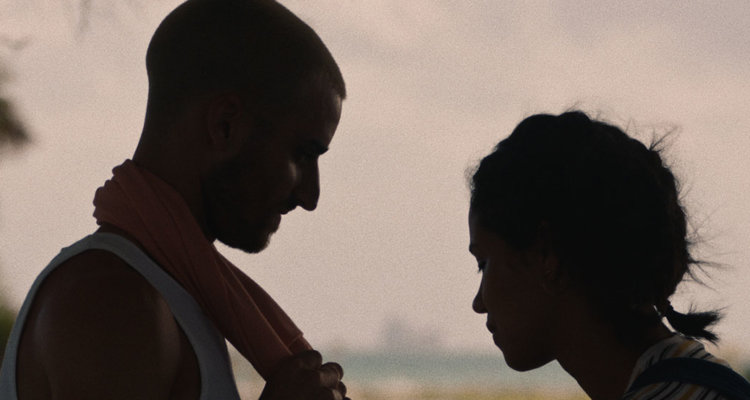Opening with the sound of crashing waves over a black screen before a grave voice begins narrating, “I guess when you consider it, life is chains,” the voice (of writer/director/actor Tyler Riggs) reflects. Like many dark indie-romances, Riggs’s debut feature is a film made up of reflective fragments — compositionally and thematically; “a bunch of moments stuck together,” as Brandon (Riggs’ character) says.
READ MORE: 2021 Tribeca Film Festival Preview: 15 Must-See Films To Watch & More
Something like a cross between 2019’s “Waves” and the recently released “Giants Being Lonely,” “Gods Waiting Room” is partly an exploration of pent-up macho rage yet primarily follows the story of a young woman trapped by rural boundaries and gendered expectations. Rosie (Nisalda Gonzalez) recently graduated high school, having decided to take at least 1 semester off before attending college instead of pursuing her passion for guitar playing. Enjoying the freedom of Florida nightlife as an adult for the first time, she falls hard for a local drug dealer with a blonde buzz cut named Julio (Matthew Leone), whom her hard-working father (Ray Benitez) appears to greatly disapprove of when he drops her off at home. Most of the movie focuses on Rosie and Julio’s relationship, only occasionally checking in with Brandon (Riggs), a recently released convict wrestling with dormant inner demons as he returns to normal life.
READ MORE: Summer 2021 Preview: Over 50 Movies To Watch
Hastily moving between scenes such as a Romeo & Juliet-esque window courting and ‘Stop staying out so late’ lectures from Rosie’s lonesome father, “Gods Waiting Room,” near-immediately establishes an intoxicating whirl of beatific young love via fleeting montages — boasting a strong eye for appearance and aesthetic — but does a poor job setting up any narrative footing. Slow and stagnant despite the ongoing swirl and fleeting natural style, Riggs film ignores any firm story promise in favor of establishing almost solely character and circumstance, resulting in a sincere lack of basic plot progression, eventually leading to an unbelievably unsatisfying pay-off that made this writer throw his hands up in rage (ironically enough).
READ MORE: The 100 Most Anticipated Films Of 2021
Aiming to make some grand statement on the ongoing growth of explosively unhinged male violence (as both “Waves” and ‘Giants’ do) while keeping that card cheaply hidden behind its back but also somehow waving it in your face, Riggs debut takes a page out of the 2006 film “Alpha Dog’s” book, inter splicing interview bits which occur after a crime has taken place, one the narrative will eventually arrive at. Brandon is seen reflecting on actions he regrets in a raw home-movie close-up, so audiences know that a swerve into crime territory is coming. The problem? Brandon is barely present throughout much of the movie, intermittently reminding viewers that he’s around, but his side of the story always feeling completely disconnected from the one audiences are invested in. Brandon’s tale is the first we hear of and the last one we care about; however, the film eventually pivots to examine how his internal sadness affects those around him, prioritizing him over two other characters we care about more.
Some of the strongest sequences revolve around juxtaposing Julio and Rosie’s lives, highlighting how differences in role and identity impact their individual journey. Intercutting between sensory moments such as contrasting a group of girls’ hotbox, blunt rotation with the boys giving themselves backwoods barbershop cuts. “God’s Waiting Room,” perhaps purposefully, is at its best when paralleling plights of morality against the pursuit of happiness and the borders which can make that feel impossible, but when bliss turns to brooding, the movie frankly gets boring. Late-night shouting matches shot with a handheld camera become the conflict’s bread and butter before too long.
It really is a shame the text of Rigg’s film ends up being so shallow because the visual motifs are frequently firing on all cylinders. Inverted shots of our star-crossed lovers illuminated by pavement showered with raindrops or the pair sharing an embrace in a pool’s reflective silhouette are quite impactful. Cogitation itself isn’t something the film has a problem with; connecting the meditative ideas is another tale entirely. The big scene that Brandon’s arc revolves around comes out of nowhere, turning into poolside porn fiction that’s so clichély telegraphed it might make you cringe a tad.
Infusing a lite-Latinx angle through Rosie and Julio’s ethnic backgrounds, “God’s Waiting Room” tries to comment on machismo culture without fully committing. In similar regard, it never focuses quite enough on Rosie’s musical pursuits/individual expression and the few scenes that do make you wonder why not more prominently highlight these aspects. A sequence in which she sings for Julio may be the movie’s standout, but, again, its foundation feels significantly removed from what the film is really interested in: showing that mad dudes become bad dudes and holding anger inside only leads to tangential violence down the line. Sure, its prevalent and, sure, some of the concluding images are powerful, but other than comment sternly in the form of a punctuation mark, from a sociological standpoint, “God’s Waiting Room” doesn’t seem to consider what it’s actually contemplating about very deeply at all. [C-]
Follow along with all our 2021 Tribeca Film Festival coverage here.

